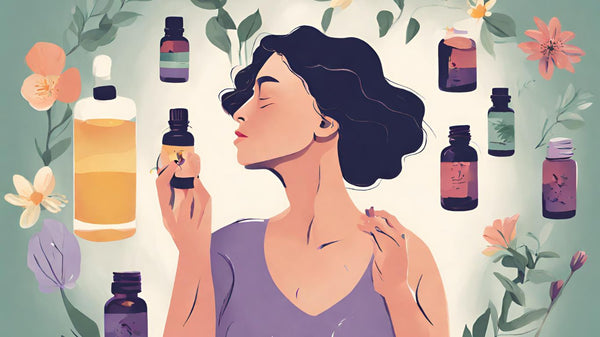Key Takeaways
-
Essential oils, derived from plants, offer therapeutic benefits for managing stress and anxiety due to their aromatic compounds.
-
Lavender, frankincense, ylang ylang, bergamot, geranium, chamomile, cedarwood, and peppermint are among the best essential oils for stress relief and anxiety management.
-
Methods of using essential oils include aromatherapy, direct inhalation, topical application, and adding to baths, providing various avenues for relaxation.
-
Precautions such as proper dilution, consideration for pregnancy, allergies, skin sensitivities, medication interactions, and consultation with healthcare providers are important when using essential oils.
- Essential oil blends, such as lavender and bergamot, chamomile and clary sage, frankincense and patchouli, geranium and rose, cedarwood and vetiver, and citrus bliss, offer synergistic effects for stress relief and emotional balance.
In today's fast-paced world, stress and anxiety have become all too common for many people.
Whether it's due to work, relationships, or other external factors, finding ways to manage and cope with these feelings is essential for maintaining overall well-being. One natural remedy that has gained popularity in recent years is essential oils.
Derived from plants, essential oils are highly concentrated liquids that contain aromatic compounds believed to have therapeutic properties.
In this article, we will explore the benefits of using essential oils for stress and anxiety, as well as how to incorporate them into your daily routine.
Best Essential Oils for Anxiety and Stress

Lavender Essential Oil
Lavender essential oil is often regarded as one of the best essential oils for anxiety and stress relief.
Studies have shown that lavender oil can help reduce anxiety levels and anxiety symptoms, making it a popular choice for those suffering from generalized anxiety disorder.
The calming scent of lavender oil can promote relaxation and relieve anxiety, making it a go-to option for those looking for natural remedies.
Frankincense Essential Oil
Frankincense essential oil has been used for centuries in traditional medicine practices for its powerful ability to promote feelings of relaxation and peace.
When inhaled, frankincense essential oil can help to reduce feelings of stress and anxiety by calming the mind and promoting emotional well-being.
One of the key benefits of frankincense oil is its ability to promote deep breathing and relaxation, which can help to reduce feelings of tension and stress in the body.
Ylang Ylang Essential Oil
Its sweet, floral scent has a calming effect on the mind and body, helping to promote relaxation and ease nervous tension.
Many studies have shown that Ylang Ylang essential oil can help to regulate heart rate and blood pressure, making it an effective tool for managing stress and anxiety.
Its sedative properties can also help to improve sleep quality, allowing for a restful night's rest.
For those suffering from chronic stress or anxiety, incorporating Ylang Ylang essential oil into their daily routine can provide much-needed relief.
Bergamot Essential Oil
One of the key benefits of bergamot essential oil is its ability to reduce cortisol levels in the body. Cortisol is known as the stress hormone, and high levels of cortisol can lead to increased feelings of anxiety and tension.
By using bergamot oil regularly, individuals can help regulate their cortisol levels and promote a sense of calm and relaxation.
In addition to its emotional benefits, bergamot oil also has physical benefits for stress and anxiety.
It can help reduce muscle tension, headaches, and other physical symptoms that often accompany stress. This makes it a versatile and effective tool for managing both the mental and physical effects of stress.
Geranium Essential Oil
Geranium essential oil is a highly effective natural remedy for managing stress and anxiety. Derived from the fragrant flowers of the geranium plant, this essential oil has been used for centuries as a holistic treatment for emotional well-being.
The balancing properties of geranium essential oil help to harmonize both the mind and body, allowing for a greater sense of calm and relaxation.
By soothing the nervous system and promoting feelings of tranquility, geranium essential oil can help alleviate symptoms of stress and anxiety.
In addition to its calming effects, geranium essential oil also has uplifting properties that can improve mood and promote positive feelings. This makes it an excellent choice for those experiencing feelings of anxiety or tension.
Chamomile Essential Oil
Chamomile essential oil is a popular remedy for stress and anxiety, known for its calming and soothing properties.
The sweet, floral aroma of chamomile oil can help promote relaxation and reduce feelings of tension and worry.
It is widely used in aromatherapy to create a peaceful and calming environment that can help alleviate feelings of stress and anxiety.
In addition to its soothing scent, chamomile oil can also be applied topically to help relax tight muscles and ease physical tension.
Cedarwood Essential Oil
The warm, woody scent of cedarwood can help to create a sense of peace and tranquility, making it a popular choice for aromatherapy and meditation practices.
Research has shown that cedarwood essential oil may help to lower levels of cortisol, a hormone that is released in response to stress. By reducing cortisol levels, cedarwood oil can help to alleviate symptoms of anxiety and promote overall well-being.
In addition, the soothing aroma of cedarwood can have a calming effect on the nervous system, helping to reduce feelings of restlessness and unease.
Peppermint Essential Oil
Peppermint essential oil has been widely known for its calming effects on stress and anxiety. It contains menthol, which is known for its soothing properties on the mind and body.
When inhaled, the refreshing aroma of peppermint oil can help relax the mind and reduce feelings of anxiety. Additionally, peppermint oil has a cooling effect when applied topically, which can help alleviate tension in the body and promote relaxation.
Furthermore, peppermint essential oil has been shown to have mood-boosting properties, making it an excellent natural remedy for those struggling with feelings of overwhelm or unease.
How to Use Essential Oils for Stress and Anxiety

There are various ways to use essential oils to help alleviate stress and anxiety.
Aromatherapy
One popular method is through aromatherapy, where essential oils are diffused into the air using a diffuser. The calming scents of oils like lavender, chamomile, and peppermint can help induce relaxation and reduce feelings of stress.
Direct Inhalation
Another way to use essential oils is through direct inhalation, where a few drops of oil are added to a cotton ball or tissue and inhaled deeply. This method can be especially helpful in moments of panic or anxiety.
Topical Application
Topical application is another common way to use essential oils for stress and anxiety. By diluting a few drops of oil with a carrier oil like coconut or almond oil, the mixture can be applied to pulse points or the bottoms of the feet. This allows the oils to be absorbed into the skin and provide a calming effect throughout the body.
Warm Bath
Some people also find relief from stress and anxiety by adding a few drops of essential oils to a warm bath. The combination of warm water and soothing scents can create a relaxing atmosphere that helps to melt away tension.
Precautions and Contraindications
Precautions should always be taken into consideration when using essential oils for stress and anxiety.
-
While essential oils can be effective in promoting relaxation and reducing tension, they can also have potential risks if not used properly. It is important to remember that essential oils are highly concentrated plant extracts and should not be used without dilution.
- Read our dilution guidelines to use essential oils safely.
-
Pregnant women should be especially careful when using essential oils, as certain oils can have adverse effects on fetal development.
-
Additionally, individuals with allergies or skin sensitivities should perform a patch test before using any essential oils topically. Some oils can cause skin irritation or allergic reactions.
-
It is also important to be aware of the potential interactions that essential oils can have with medications or existing health conditions. Certain oils can interfere with medications or exacerbate certain health conditions.
- Always consult with a healthcare provider before using essential oils, especially if you are taking any medications or have a medical condition.
Essential Oil Blends for Stress and Anxiety
Serenity Fusion Blend:
- 3 drops of Lavender essential oil
- 2 drops of Bergamot essential oil
- 2 drops of Ylang Ylang essential oil
This blend is known for its calming and uplifting properties, helping to alleviate stress and promote relaxation.
Calming Bliss Blend:
- 3 drops of Roman Chamomile essential oil
- 2 drops of Clary Sage essential oil
- 2 drops of Frankincense essential oil
This blend can help to soothe nervous tension and promote a sense of tranquility.
Sacred Earth Blend:
- 3 drops of Frankincense essential oil
- 2 drops of Patchouli essential oil
- 2 drops of Sweet Orange essential oil
This combination is grounding and can help to center the mind, reducing feelings of anxiety.
Floral Harmony Blend:
- 3 drops of Geranium essential oil
- 2 drops of Rose essential oil
- 2 drops of Lavender essential oil
This blend is comforting and can help to balance emotions, reducing stress and promoting a sense of well-being.
Woody Calm Blend:
- 3 drops of Sandalwood essential oil
- 2 drops of Vetiver essential oil
- 2 drops of Cedarwood essential oil
This blend is grounding and can help to calm the mind, promoting relaxation and reducing anxiety.
Citrus Bliss Blend:
- 3 drops of Sweet Orange essential oil
- 2 drops of Lemon essential oil
- 2 drops of Grapefruit essential oil
This blend is uplifting and energizing, helping to lift mood and reduce stress.
Frequently Asked Questions - FAQs
Can essential oils replace medication for stress and anxiety?
While essential oils can be a helpful complement to other stress-relief techniques, they should not replace prescribed medication or professional medical treatment for anxiety disorders.
How long do the effects of essential oils for stress and anxiety last?
The duration of the effects can vary depending on factors such as the type of essential oil used, individual sensitivity, and method of application. Generally, the effects may last for a few hours after inhalation or application.
Can essential oils be ingested for stress and anxiety relief?
Ingesting essential oils is not recommended unless under the guidance of a qualified aromatherapist or healthcare professional, as some essential oils can be toxic when taken internally.
Where to apply essential oils for anxiety?
Apply diluted essential oil blends to wrists, temples, chest, neck, feet, or behind ears. Dilution is crucial to prevent skin irritation.
Which essential oils are best for stress and panic attacks?
Lavender, chamomile, bergamot, and frankincense are commonly recommended for stress and panic attacks due to their calming properties.
How do roll-on essential oils help with anxiety?
Roll-on essential oils provide convenient and direct application of calming scents, such as lavender or peppermint, which can help alleviate anxiety symptoms when applied to pulse points like wrists or temples.
Conclusion
In today's hectic world, stress and anxiety affect many individuals, prompting the search for natural remedies. Essential oils, derived from plants, offer a promising solution due to their therapeutic properties.
Among the standout options are Lavender, Frankincense, Ylang Ylang, and others, each renowned for their calming effects on the mind and body.
For those seeking high-quality essential oils, Aromafarmacy offers a range of products to support your journey toward tranquility and balance.

